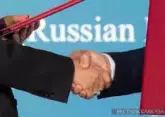Director of the Berlin political center Stiftung Wissenschaft und Politik (SWP), Professor Volker Perthes, told the DLF about Saudi Arabia's King Salman bin Abdulaziz al Saud's recent visit to Moscow, during which he held talks with President Vladimir Putin.
"It's probably too early to talk about Saudi Arabia's rapprochement with Russia, but the Saudis are pragmatically diversifying their external ties. Due to the White House's uncertainty, Riyadh does not want to be unilaterally dependent on the United States," Perthes believes. "It is also important to note that Russia has once again become a very important player in the Middle East, especially in Syria, and it will be fair to say that it was Russia that won (or nearly won) the war in Syria, not one or another Syrian side of the conflict. Therefore, attempts to agree with Russia are underway," the expert noted. "Russia, in turn, knows that if it wants to turn a military victory in Syria into a full-fledged stabilization, it needs to enlist the support of regional powers like Saudi Arabia, which has very great influence on those opposing the Syrian regime," Volker Perthes stressed.

The SWP director emphasized that there are no strong alliances in the Middle East. "There are a number of larger and smaller states that pursue their own national interests, often at the expense of their neighbors' interests, both close and distant, and enter into situational alliances with regional and world powers for this purpose. Accordingly they say in Saudi Arabia: "We see what happens in Syria, Russia has great influence there, and if we have to choose, then we would prefer the Russian influence to Iranian. Therefore, we will try to achieve a gentlemanly agreement with Moscow on Syria, on which we both will be able to agree somehow".
The political scientist also drew attention to the political aspect of Saudi Arabia's alleged purchase of Russian weapons worth $3 billion. In particular, according to Arab media reports, Riyadh plans to purchase Russia's S-400 Triumph missile systems.
"On the one hand, the purchase of weapons is unquestionably a security issue for the Saudi army. But in the Middle East, arms purchase deals is the method of small and larger countries in the Persian Gulf, that have been tried many times, to ensure a benevolent relationship with the international forces," the professor Volker Perthes concluded.










